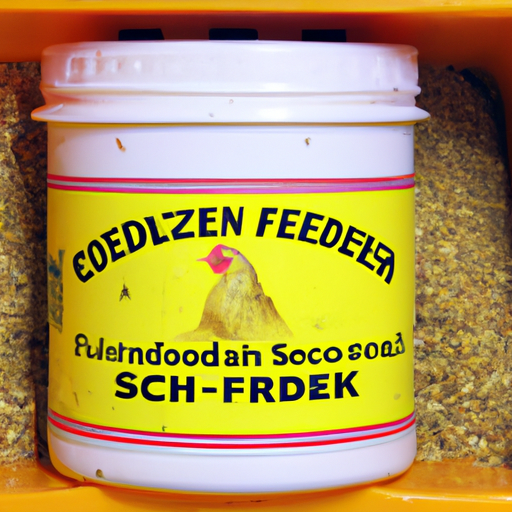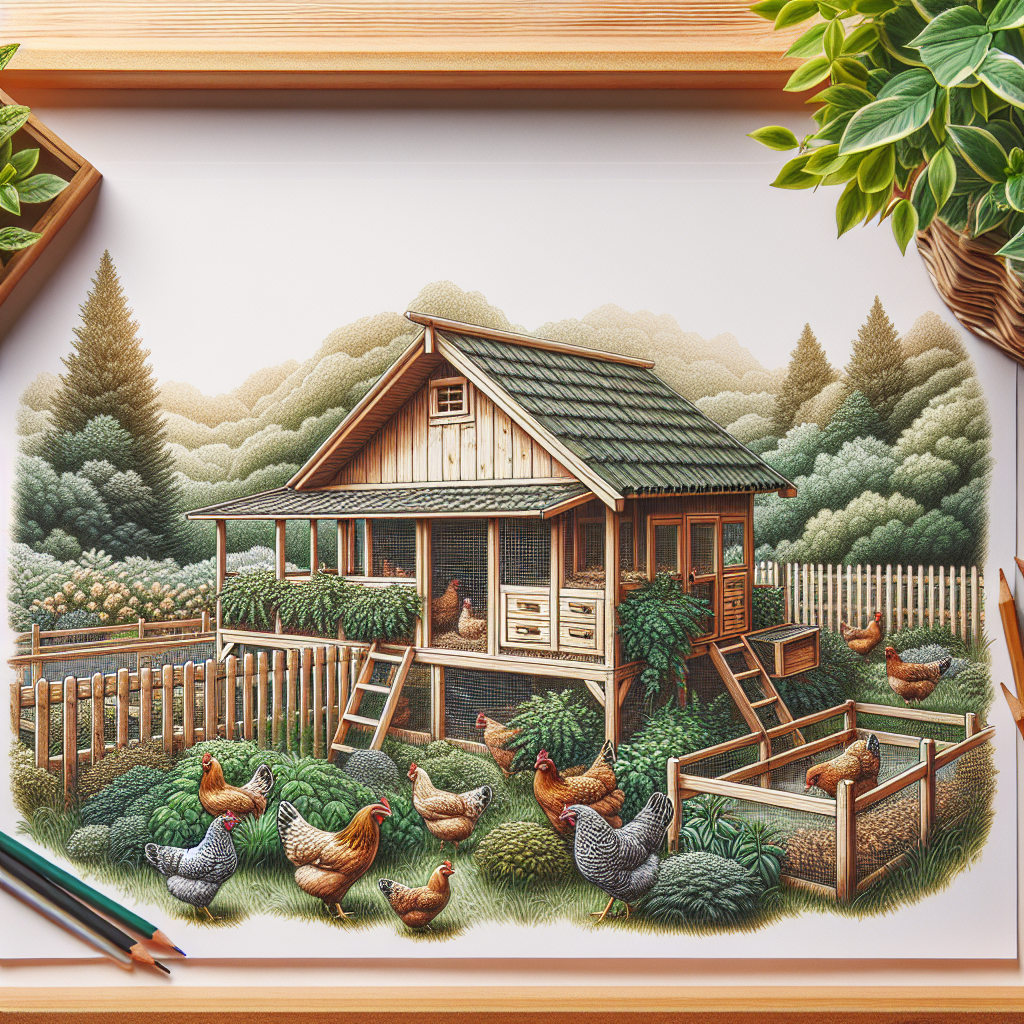If you’re a proud chicken owner, you know how crucial it is to keep your feathered friends healthy and well-fed. But how can you ensure that the chicken feed stays fresh and uncontaminated? In this article, we’ll explore some handy tips and tricks that you can easily implement to maintain the quality of your chickens’ feed. From proper storage techniques to pest prevention, you’ll discover simple yet effective ways to keep your chickens happy and healthy, while also preserving the freshness and integrity of their feed. So, let’s dive in and learn how to make sure your chickens get the best possible nutrition every time they peck away at their feed!
Proper Storage
Choose a dry and cool storage area
To keep your chicken feed fresh and uncontaminated, it is important to choose a storage area that is dry and cool. Moisture can lead to mold and bacteria growth in the feed, which can be harmful to your chickens. A dry and cool storage area will help maintain the quality of the feed and prevent spoilage.
Use airtight containers or bins
Another crucial step in proper storage is using airtight containers or bins to store the chicken feed. This will help prevent the entry of moisture, pests, and contaminants from the environment. Airtight containers will also keep the feed fresh and maintain its nutritional value for a longer period of time.
Store feed away from chemicals and pests
It is important to store the chicken feed away from chemicals and pests. Chemicals can contaminate the feed and make it unsafe for consumption by your chickens. Additionally, pests like rodents and insects can get into the feed and make it unsanitary. Make sure to store the feed in a separate room or area away from any chemicals and use pest deterrents like traps or repellents to keep pests at bay.
Quality Ingredients
Purchase feed from reputable sources
To ensure the safety and freshness of your chicken feed, it is crucial to purchase it from reputable sources. Look for suppliers or brands that have a good reputation for providing high-quality feed. They are more likely to follow proper manufacturing and storage practices, reducing the risk of contamination or spoilage.
Check the ingredient list for freshness
When purchasing chicken feed, it is important to check the ingredient list for freshness. Look for feeds that have a shorter list of ingredients, as this indicates a higher likelihood of freshness. Additionally, check for any signs of discoloration, clumping, or unusual odors, as these can be indicators of spoiled feed.
Avoid feed with additives or contaminants
Be mindful of feed that contains additives or contaminants. Some feeds may have additives like antibiotics or growth hormones, which can be harmful to your chickens. Contaminants such as pesticides or heavy metals can also pose a risk. Opt for feeds that are free from unnecessary additives and have undergone rigorous testing for contaminants.
Effective Handling
Wash hands before handling feed
Before handling chicken feed, make sure to wash your hands thoroughly. This will help prevent the transfer of any bacteria or contaminants from your hands to the feed. Use warm water and soap, and dry your hands properly before handling the feed.
Use clean scoops or containers
When scooping or measuring chicken feed, always use clean scoops or containers. Avoid using dirty or contaminated tools, as they can introduce unwanted substances into the feed. Clean your scoops or containers regularly to maintain good hygiene and prevent cross-contamination.
Avoid direct contact between feed and ground
To keep the feed uncontaminated, it is important to avoid direct contact between the feed and the ground. Place the feed in elevated areas or use racks or platforms to keep it off the ground. This will prevent moisture, pests, and dirt from coming into contact with the feed.
Regular Rotation
Implement a first-in, first-out system
To prevent feed from becoming stale or spoiled, it is essential to implement a first-in, first-out (FIFO) system. This means using the oldest feed first and placing newly purchased feed at the back of the storage area. By following this system, you ensure that the feed is used before its expiration date and minimize the risk of spoilage.
Rotate feed to prevent staleness
In addition to the FIFO system, it is important to regularly rotate the feed. Mixing the feed periodically will help prevent any clumping or separation of ingredients, ensuring a more consistent quality. It will also help in preventing staleness and maintaining the nutritional value of the feed.
Monitor expiration dates
Always keep an eye on the expiration dates of the chicken feed. Make it a habit to check the dates regularly and remove any feed that is past its expiration date. Using expired feed can lead to reduced nutritional value and potential health risks for your chickens.
Proper Feeding Practices
Feed chickens only what they can consume
When feeding your chickens, it is important to provide them with only what they can consume in a reasonable amount of time. Overfeeding can lead to wastage and attract pests to the coop. Offer enough feed to satisfy their needs but avoid leaving excess feed that can go to waste.
Avoid leaving feed out for extended periods
Leaving feed out for extended periods can result in exposure to moisture, pests, and contaminants. It is best to remove any uneaten feed after your chickens have finished eating. This will prevent the feed from becoming stale or spoiled, ensuring that your chickens get fresh and uncontaminated feed each time.
Clean feeding dishes regularly
To maintain good hygiene, clean the feeding dishes regularly. Remove any leftover feed, wash the dishes with warm soapy water, and rinse thoroughly. This will help prevent the buildup of bacteria or contaminants that can be harmful to your chickens.
Prevent Moisture
Keep feed dry to prevent mold and bacteria growth
Moisture is a common factor that can lead to the growth of mold and bacteria in chicken feed. To prevent this, it is crucial to keep the feed dry at all times. Store the feed in a dry area, away from any potential sources of moisture. Avoid storing feed in damp or humid areas, as this can accelerate the growth of mold and bacteria.
Avoid storing feed in damp areas
As mentioned earlier, storing feed in damp areas should be avoided. Dampness can promote the growth of mold and bacteria, compromising the quality and safety of the feed. Choose a storage area that is well-ventilated and dry, ensuring that the feed remains uncontaminated and fresh.
Use moisture-absorbing products
To further prevent moisture buildup, consider using moisture-absorbing products in the storage area. Silica gel packets or moisture-absorbing crystals can help absorb excess moisture, keeping the feed dry and free from mold or bacteria growth. Place them strategically in the storage area to maximize their effectiveness.
Pest Control
Inspect storage area for signs of pests
Regularly inspect the storage area for any signs of pests. Look for droppings, gnaw marks, or nests that indicate the presence of rodents or insects. If you notice any signs of pests, take immediate action to eliminate them and prevent them from contaminating the feed.
Seal any openings or cracks
To prevent pests from entering the storage area, seal any openings or cracks. This includes gaps around doors, windows, or vents. Use materials like caulk or weatherstripping to close off these entry points and prevent pests from gaining access to the feed.
Use pest deterrents like traps or repellents
In addition to sealing openings, consider using pest deterrents like traps or repellents. Place traps strategically in areas where pests are likely to be present, such as near entry points or corners. Repellents, such as essential oils or natural deterrents, can also help keep pests away from the feed storage area.
Regular Inspection
Check feed for signs of molding or spoilage
Regularly inspect the chicken feed for any signs of molding or spoilage. Look for visible signs such as visible mold growth, unusual discoloration, or a foul odor. If you notice any of these signs, discard the feed immediately and replace it with fresh feed to ensure the health and safety of your chickens.
Look for unusual odors or discoloration
In addition to visible signs of spoilage, pay attention to any unusual odors or discoloration in the feed. If the feed smells off or has an unusual color, it could be an indication of spoilage. Trust your senses and err on the side of caution by disposing of any feed that appears abnormal.
Monitor feed consumption and behavior
Another way to ensure that your chicken feed remains uncontaminated and fresh is to monitor your chickens’ feed consumption and behavior. Sudden changes in appetite or behavior can indicate a problem with the feed. If you notice any abnormalities, consult a poultry or feed specialist to identify and address the issue promptly.
Proper Transportation
Ensure feed bags are intact and sealed
When transporting chicken feed, it is important to ensure that the bags are intact and sealed. Check for any tears or openings in the bags and make sure they are securely closed. This will prevent any spillage or exposure to contaminants during transportation.
Store feed securely during transport
During transportation, store the chicken feed securely to prevent any movement or shifting that could damage the bags or compromise their integrity. Secure the bags in a way that prevents them from banging against each other or sliding around, ensuring that the feed remains fresh and uncontaminated.
Minimize exposure to extreme temperatures
To maintain the quality of the chicken feed during transportation, it is important to minimize its exposure to extreme temperatures. Avoid leaving the feed in direct sunlight or in vehicles that are too hot or too cold. Extreme temperatures can accelerate spoilage and compromise the nutritional value of the feed.
Consulting Experts
Seek advice from poultry or feed specialists
If you have any questions or concerns about the freshness and safety of your chicken feed, don’t hesitate to seek advice from poultry or feed specialists. They can provide valuable guidance based on their expertise and help address any specific concerns you may have.
Join online forums or communities for guidance
Another great way to access information and guidance is by joining online forums or communities dedicated to chicken keeping and feed management. These platforms allow you to connect with other chicken owners who can share their experiences and offer advice on ensuring feed freshness and safety.
Attend workshops or seminars on chicken feed
Consider attending workshops or seminars focused on chicken feed and nutrition. These events offer opportunities to learn from experts, ask questions, and gain hands-on knowledge. By enhancing your understanding of proper feed management, you can ensure that your chickens receive the best quality feed.
In conclusion, ensuring the freshness and uncontaminated state of your chicken feed is essential for the health and well-being of your flock. By following proper storage practices, selecting high-quality ingredients, implementing effective handling techniques, regular rotation, practicing proper feeding practices, preventing moisture, pest control, regular inspection, proper transportation, and seeking advice from experts, you can maintain the freshness and safety of the feed, providing your chickens with the nutrition they need to thrive. Remember, a little effort in preserving the feed goes a long way in promoting the overall health and productivity of your chickens.




